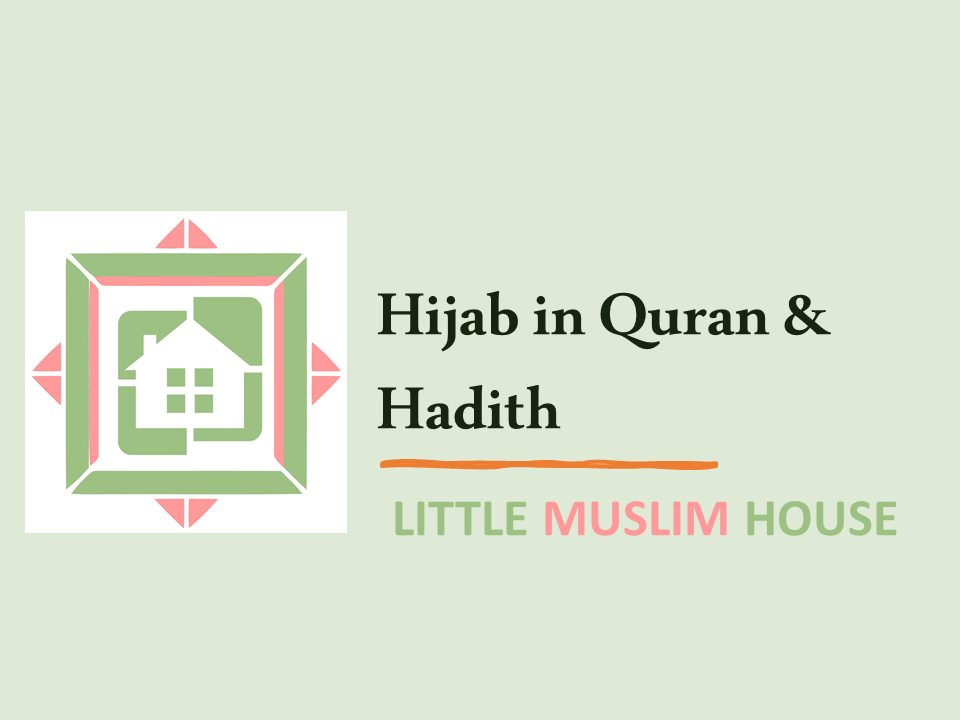Islam places much emphasis on modesty and the Hijab is at the helm of a Muslim woman’s modesty. Allah made the Hijab obligatory upon the believing woman for the purpose of guarding her, to shield her from harassment and the preying eyes of the less honorable.
What is Hijab?
Hijab is an Arabic term that is literally translated to mean curtain or partition i.e. anything meant to prevent something from being seen. In the Quran, occurrences of the word Hijab refer to exactly that and not necessarily the dress code for Muslim women. Over the years, the word ‘Hijab’ has been culturally adopted to mean the dress code. In today’s world, the Hijab is widely referred to the head covering or headscarf that is donned by Muslim women plus the general practice of fully covering their body from being seen. It is a means of protecting women from uninvited (sinister) attention.
Having said that, although the word Hijab is not used in the Quran to mean this dress code, the dress code itself has been clearly explained and mandated in the Quran and Sunnah.
Hijab in Quran
For the reason stated above, many have attempted to dispute the fact that Muslim women are required to cover themselves. It is a belief held among a minority, that Muslim women were never obligated to wear the Hijab since the word “Hijab” is not used in the Quran in this context. They believe that women in Arabia had always maintained a head covering as an accessory to their outfit as a cultural practice.
However, the verses below are clear proof against this. Muslim women are required to cover themselves in order to protect themselves.
Surah Al-Ahzab [33:59]
يٰۤـاَيُّهَا النَّبِىُّ قُلْ لِّاَزۡوَاجِكَ وَبَنٰتِكَ وَنِسَآءِ الۡمُؤۡمِنِيۡنَ يُدۡنِيۡنَ عَلَيۡهِنَّ مِنۡ جَلَابِيۡبِهِنَّ ؕ ذٰ لِكَ اَدۡنٰٓى اَنۡ يُّعۡرَفۡنَ فَلَا يُؤۡذَيۡنَ ؕ وَكَانَ اللّٰهُ غَفُوۡرًا رَّحِيۡمًا
O Prophet! Ask your wives, daughters, and believing women to draw their cloaks over their bodies. In this way it is more likely that they will be recognized as virtuous and not be harassed. And Allah is All-Forgiving, Most Merciful. [Surah Al-Ahzab 33:59]
Surah An-Noor [24:31]
وَقُل لِّلْمُؤْمِنَـٰتِ يَغْضُضْنَ مِنْ أَبْصَـٰرِهِنَّ وَيَحْفَظْنَ فُرُوجَهُنَّ وَلَا يُبْدِينَ زِينَتَهُنَّ إِلَّا مَا ظَهَرَ مِنْهَا ۖ وَلْيَضْرِبْنَ بِخُمُرِهِنَّ عَلَىٰ جُيُوبِهِنَّ ۖ وَلَا يُبْدِينَ زِينَتَهُنَّ إِلَّا لِبُعُولَتِهِنَّ أَوْ ءَابَآئِهِنَّ أَوْ ءَابَآءِ بُعُولَتِهِنَّ أَوْ أَبْنَآئِهِنَّ أَوْ أَبْنَآءِ بُعُولَتِهِنَّ أَوْ إِخْوَٰنِهِنَّ أَوْ بَنِىٓ إِخْوَٰنِهِنَّ أَوْ بَنِىٓ أَخَوَٰتِهِنَّ أَوْ نِسَآئِهِنَّ أَوْ مَا مَلَكَتْ أَيْمَـٰنُهُنَّ أَوِ ٱلتَّـٰبِعِينَ غَيْرِ أُو۟لِى ٱلْإِرْبَةِ مِنَ ٱلرِّجَالِ أَوِ ٱلطِّفْلِ ٱلَّذِينَ لَمْ يَظْهَرُوا۟ عَلَىٰ عَوْرَٰتِ ٱلنِّسَآءِ ۖ وَلَا يَضْرِبْنَ بِأَرْجُلِهِنَّ لِيُعْلَمَ مَا يُخْفِينَ مِن زِينَتِهِنَّ ۚ وَتُوبُوٓا۟ إِلَى ٱللَّهِ جَمِيعًا أَيُّهَ ٱلْمُؤْمِنُونَ لَعَلَّكُمْ تُفْلِحُونَ
And tell the believing women to lower their gaze and guard their chastity, and not to reveal their adornments except what normally appears. Let them draw their veils over their chests, and not reveal their hidden adornments except to their husbands, their fathers, their fathers-in-law, their sons, their stepsons, their brothers, their brothers’ sons or sisters’ sons, their fellow women, those bondwomen in their possession, male attendants with no desire, or children who are still unaware of women’s nakedness. Let them not stomp their feet, drawing attention to their hidden adornments. Turn to Allah in repentance all together, O believers, so that you may be successful. [Surah An-Noor 24:31]
Surah An-Noor [24:60]
The verse below was also revealed that the outer garment (e.g. a cloak) has been made optional for older Muslim women whose menstrual cycle has ended and hence have passed their age for marriage and childbearing. Although the first part of the ayah states that older women are not required to wear the hijab (in this ayah, outer garment implies the hijab), the second part of the ayah further explains that it is better for them to continue wearing the Hijab even at an old age because Allah knows what we do not.

وَٱلْقَوَٰعِدُ مِنَ ٱلنِّسَآءِ ٱلَّـٰتِى لَا يَرْجُونَ نِكَاحًۭا فَلَيْسَ عَلَيْهِنَّ جُنَاحٌ أَن يَضَعْنَ ثِيَابَهُنَّ غَيْرَ مُتَبَرِّجَـٰتٍۭ بِزِينَةٍۢ ۖ وَأَن يَسْتَعْفِفْنَ خَيْرٌۭ لَّهُنَّ ۗ وَٱللَّهُ سَمِيعٌ عَلِيمٌۭ
As for elderly women past the age of marriage, there is no blame on them if they take off their ˹outer˺ garments, without revealing their adornments. But it is better for them if they avoid this ˹altogether˺. And Allah is All-Hearing, All-Knowing. [An-Noor 24:60]
Hadith about Hijab
In order to gain a complete understanding of the above Quranic verses, it is important to seek the Prophet’s (PBUH) explanation synonymously, as Allah has revealed in Surah An-Naml [16:44]. A number of narrations are available with regard to the Hijab:
Hadith on Hijab
Narrated Safiya bint Shaiba: Aisha used to say: “When (the verse): “They should draw their veils over their necks and bosoms…,” was revealed, (the ladies) cut their waist sheets at the edges and covered their heads and faces with those cut pieces of cloth.” [Sahih Al-Bukhari]
The Hadith above shows that the believing women of the time understood the verse as stated above (Surah An-Noor 24:31) and were quick to follow. It shows beyond doubt that it was not a cultural practice, otherwise they would not have had to cut pieces of cloth to cover their bodies as prescribed. This Hadith specifically mentions that they veiled their heads as well as their faces – referring to the Hijab.
Although women are not required to follow this dress code when they are at home in the absence of adult men who are not related to them (or their husbands), women are also required to follow this dress code when performing their prayers as stated in the following Hadith.
Ayesha (RA) narrated that:
Allah’s Messenger said: “The Salat of a women who has reached the age of menstruation is not accepted without a Khimar” [Jami’ at-Tirmidhi 377]
Hadith on Hijab and modesty of clothing
Allah’s Messenger (PBUH) used to offer the Fajr prayer and some believing women, covered with their veiling sheets, used to attend the Fajr prayer with him and then they would return to their homes unrecognized. [Sahih Al-Bukhari]
Narrated Aisha: Umar bin Al-Khattab used to say to Allah’s Messenger (PBUH) “Let your wives be veiled” But he did not do so. The wives of the Prophet (PBUH) used to go out to answer the call of nature at night only at Al-Manasi. Once Sauda, the daughter of Zama (a wife of the Messenger of Allah PBUH), went out and she was a tall woman. Umar bin Al-Khattab saw her while he was in a gathering, and said, “I have recognized you, O Sauda!” He (Umar) said so as he was anxious for some Divine orders regarding the veil (the veiling of women.) So Allah revealed the verse of veiling. [Sahih Al-Bukhari]
These Sahih AHadeeth point to the practice of the early Muslim women dressing modestly so as to not reveal their figure. They maintained modesty in their clothing to such a degree that those around could not recognize who they were.
In the second Hadeeth it is stated that Umar Bin Al-Khattab (RA) had advised RasulUllah (PBUH) to keep his wives veiled from public view so as to protect their honor and dignity. This was before the verses of Hijab were revealed. Although the wives of RasulUllah (PBUH) did follow this practice, specially in public, once he recognized Sauda (RA) – one of the wives of RasulUllah (PBUH), while she was going somewhere, because of her height. Although she was fully covered, Umar (RA) mentioned to her that he was able to recognize her – implying to her that her covering was not hiding her identity well enough. It was soon after that, that the verses of Hijab were revealed. The rules of Hijab were stricter for the wives of RasulUllah (PBUH). Although what Sauda (RA) did would have been more than sufficient for the average Muslimah, it was not enough for the wife of the Messenger of Allah (PBUH). After the verses of Hijab were revealed, our mothers – the wives of RasulUllah (PBUH) followed them perfectly.
While practicing modesty in clothing and behavior for Muslim women is greatly stressed upon in Islam, the believing men have been instructed to avoid allowing their gaze to wander on non-mahram women.
Abdullah bin Masud narrated: “We went with Allah’s Messenger, while we were young men who had nothing. He said: ‘O young men! You should marry, for indeed it helps in lowering the gaze and protecting the private parts. Whoever among you is not able to marry, then let him fast, for indeed fasting will diminish his sexual desire.” [Jami At-Tirmidhi]
And Allah Knows Best.
References:
https://islamqa.info/en/answers/13998/verses-and-hadeeth-about-hijab
https://www.soundvision.com/article/quranic-verses-about-hijab

